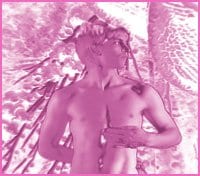Barry Truax is one of our hidden unknown treasures-an internationally renowned figure in one of the most rarefied of artistic fields: electroacoustic music. The out gay, 57-year-old composer seems accustomed to having to explain to lay people what exactly electroacoustic music is.
“It’s essentially music that relies on technology to produce it and to perform it,” he says, having lunch at the sonically vibrant Café Calabria on Commercial Dr. He adds that “it was one of the most dramatic things that happened in the 20th century to music. Suddenly you can not just amplify sounds, but you can record sounds, you can synthesize sounds, you can create virtual soundscapes.”
To elaborate on Truax’s explanation, electroacoustic music uses both sounds that are produced electronically and those which come from natural sources. These sounds are then transformed electronically and combined with each other to create musical compositions.
“I’d like to get a pet peeve off my chest right away,” he says, laughing. “The mass media, including the CBC, have done a remarkably effective job keeping people ignorant of this art form. It’s actually very well established in Canada and abroad.
But because it’s totally off the radar screen, people just don’t know about it. And yet it has a 50-year history. It is very well established and it has wonderful potential for all kinds of things, including theatre and music.”
It’s different in Europe, says Truax, where electroacoustic music, because it is played regularly on radio stations, has entered the popular consciousness.
The native of Chatham, Ontario, now a north Burnaby resident, is a professor in both the school of communication and the school for the contemporary arts at Simon Fraser University, where he teaches courses in acoustic communication and electroacoustic music.
Born into a musical family, Truax was introduced to music early, starting piano lessons at the age of five. He began composing music while obtaining his bachelor of science degree in physics and mathematics at Queen’s University in Ontario, but it wasn’t until he started his graduate studies at UBC that he realized that music was his true calling. When asked how his extensive background in physics and mathematics has influenced his music, Truax says, “It made me unafraid of technology.”
He is doing this interview while on lunch break from rehearsal of his latest opus, Powers of Two, which is being given a workshop production by Modern Baroque Opera Jun 2-6 at the Scotiabank Dance Centre.
The opera focusses on three young urban couples-one hetero, one lesbian, one gay-and their quest for wholeness and fulfillment. It is, in all likelihood, the first piece of electroacoustic music to deal with gay themes. In addition, says Truax, Powers of Two may be one of the very first operas to feature gay characters in a positive light. “There really have been no positive gay characters in opera. There have been a modern few operas where there are gay characters, but in most of those cases it was usually subtext, or the characters just ‘happened’ to be gay. There really have been no operas that are ‘about’ being gay. I think act three [of Powers of Two] will be quite a shock for audiences, when the gay male character starts singing about his desire for another man. This isn’t subtext anymore. It’s blatant and in your face.”
To audiences warily expecting the atonality and dissonance that are usually associated with contemporary music, Truax has these words of reassurance: “This opera is totally lyrical. Totally, totally, totally lyrical. Lyrical is the key word. Everything is lyrical.”
Truax, as a gay man, is something of an anomaly in the world of electroacoustic music. “I’d be hard pressed to find 10 [gay electroacoustic composers] worldwide,” he says. “I’m just wondering if gays have been filtered out in some way.” Elaborating, Truax says that there are relatively few women in the field as well. “It’s what I call the ‘techno-macho mystique.’ Jazz had a similar macho mystique-it was an extremely homosocial milieu, where issues of gender and sexual identity were never discussed. It’s prevalent in all of the technological fields, not just music.
“It really bugs me when I see my heterosexual male colleagues not question the gender implications of what they’re doing, because gender is in everything that we do. It’s processed in everything that we do. I’m not saying they’re homophobic or anything like that but you know how it is. If it’s a straight male milieu, are gay people going to feel comfortable in it? Are women going to feel comfortable in it?”
So is Truax an artist who happens to be gay or a gay artist? The latter, he says. “I think the hardest part is to incorporate [my gayness] into the work itself, as opposed to the conventional wisdom that, you know, we’re only interested in quality, and if you happen to be this or happen to be that it shouldn’t matter. I just don’t accept that anymore. If it’s that important a part of your life, I think you want to incorporate it directly into your work. I suppose I can say that I’m established enough that I’m not taking any big risks. But there comes a certain point where you’re willing to make certain fundamental choices about art, and you feel you want to make statements about it.”
He then brings up a striking analogy. “If you look in the mirror and there’s no reflection, you don’t exist.”
POWERS OF TWO.
Jun 2-6, 2004.
Scotiabank Dance Centre.
677 Davie St.
Tickets: (604) 216-1114.

 Why you can trust Xtra
Why you can trust Xtra


